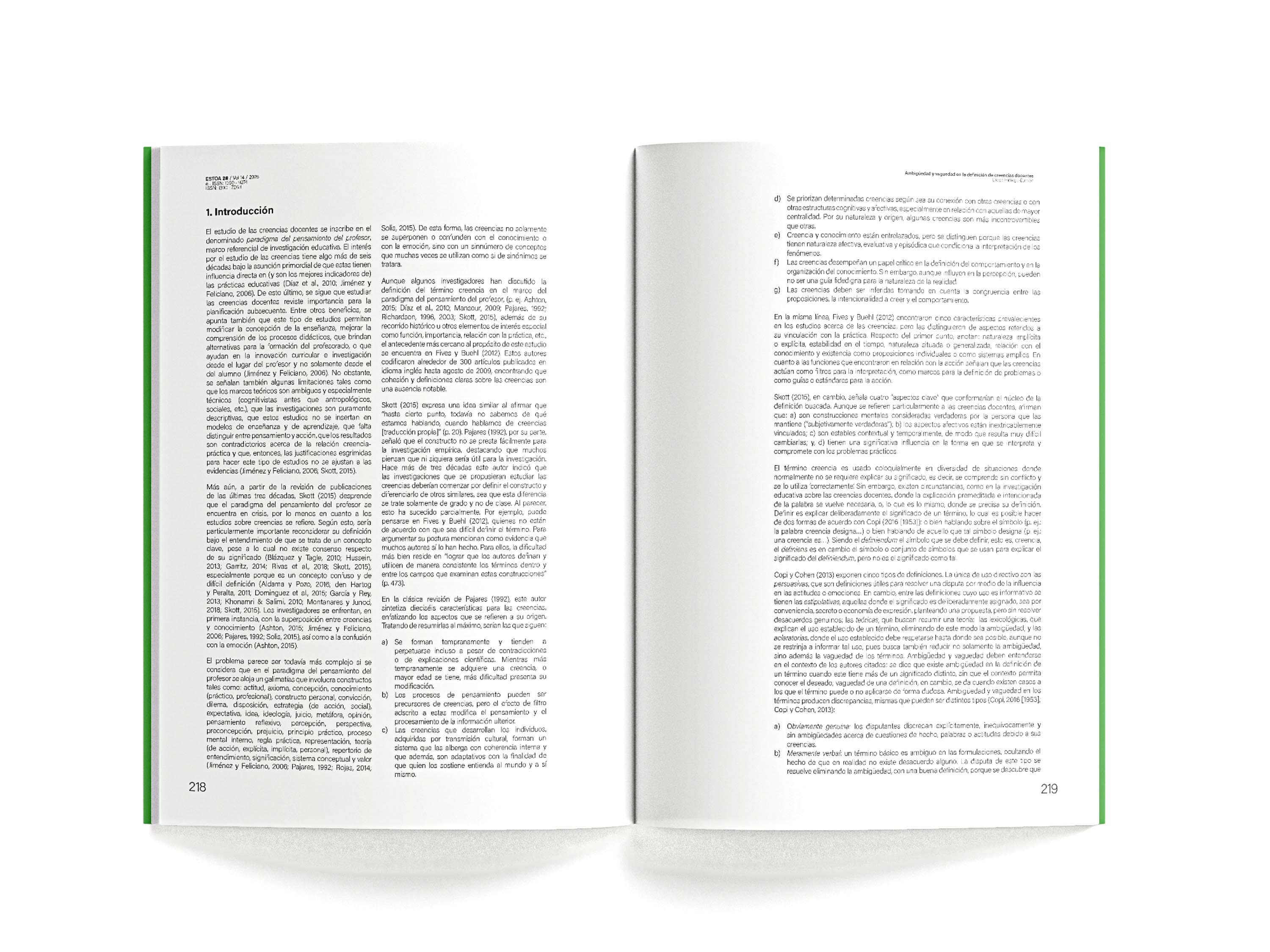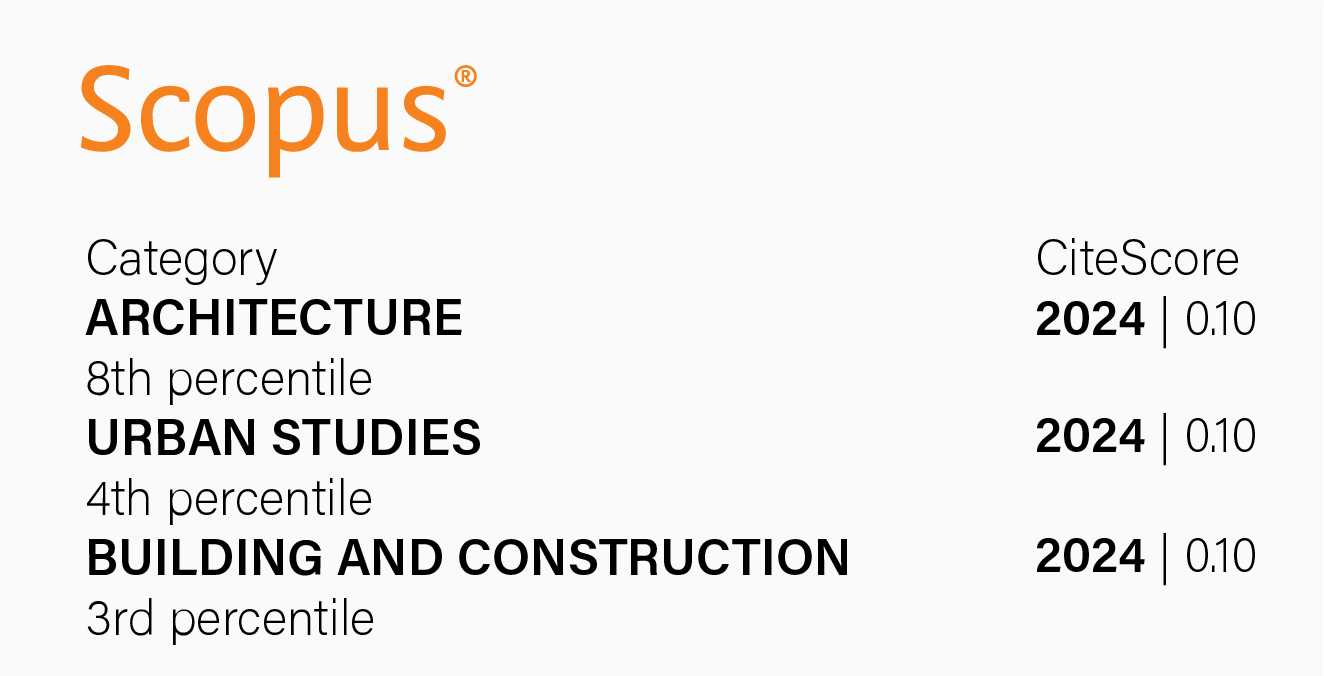Ambiguity and vagueness in the definition of teachers’ beliefs
DOI:
https://doi.org/10.18537/est.v014.n028.a15Keywords:
teachers’ beliefs, educational research, definition, ambiguity, vaguenessAbstract
Confusion, lack of clarity or lack of consensus are the main qualifications used by those who have dealt with the conceptualization problems of teachers’ beliefs. It has even been claimed that after almost seven decades we still do not know what we talk about when refer to beliefs. Therefore, the aim of this study is to identify the central ideas contained within the definitions provided in this field since 2009. To achieve this, 102 articles published both in Spanish and in English have been reviewed. It is concluded that the term ‘belief’ is either used colloquially, i.e. as an assent, conformity or credit given to something, in which case a ‘belief’ would be what teachers express when they answer questions such as what do you believe (think, consider, etc.) about…? or that, instead of confusion, lack of clarity or lack of consensus, it would be more appropriate to talk about ambiguity and vagueness in the definitions.
Downloads
References
Abarza, L. y Ávila, E. (2012). Creencias de autoeficacia de docentes de la Universidad Autónoma de Chile, y su relación con los resultados de la evaluación docente. Revista de Psicología, 2(4), 33-56. https://hdl.handle.net/20.500.12536/534
Aldama, C. & Pozo, J. (2016). How are ICT used in the classroom? A study of teachers’ beliefs and uses. Electronic Journal of Research in Educational Psychology, 14(2), 253-286. http://dx.doi.org/10.14204/ejrep.39.15062
Álvarez, C. y Navas, R. (2020) Evaluación del aprendizaje en odontología: concepciones y creencias de los docentes. Acta Odontológica Colombiana, 10(2), 82-99. https://doi.org/10.15446/aoc.v10n2.86859
Andrade, J. (2013). Creencias sobre el uso de las TIC de los docentes de educación primaria en México. Sinéctica. Revista Electrónica de Educación, (41), 1-13. https://www.scielo.org.mx/scielo.php?script=sci_arttext&pid=S1665-109X2013000200013
Ashton, P. (2015). Historical overview and theoretical perspectives of research on teachers’ beliefs. En H. Fives & M. Gregoire (Eds.), International Handbook of Research on Teachers’ Beliefs (pp. 31-47). Routledge.
Blázquez, F. y Tagle, T. (2010). Formación docente: un estudio de las creencias de alumnos y profesores sobre el proceso de enseñanza y aprendizaje del inglés. Revista Iberoamericana de Educación, 54(4), 1-12. https://doi.org/10.35362/rie5441659
Cárdenas, H. (2011). Referentes teóricos y metodológicos de los docentes en servicio con una perspectiva de inclusión educativa: creencias y prácticas. Revista Actualidades Investigativas en Educación, 11(2), 1-38. https://doi.org/10.15517/aie.v11i2.10201
Chamorro, D. (2023). Análisis de las creencias docentes acerca de la formación gubernamental en el Departamento del Cauca-Colombia. Revista Educación, 47(2), 1-18.https://doi.org/10.15517/revedu.v47i2.53991
Clark, L., Neumayer, J., Jones, T., Nishio, M., Campbell, P. Smith, T. Griffin, M. Rust, A., Conant, D. &, Choi, Y. (2014). Teacher Characteristics Associated with Mathematics Teachers’ Beliefs and Awareness of Their Students’ Mathematical Dispositions. Journal for Research in Mathematics Education, 45(2), 246–284. https://doi.org/10.5951/jresematheduc.45.2.0246
Copi, I. (2016 [1953]). Introducción a la lógica. Eudeba.
Copi, I. y Cohen, C. (2013). Introducción a la lógica. (2a ed.). Limusa.
Den Hartog, C. & Peralta, C. (2011). Bilingual Teacher Beliefs and Practice: Do They Line Up? Gist Education and Learning Research Journal, (5), 66-83. https://dialnet.unirioja.es/servlet/articulo?codigo=4707832
Díaz, C., Martínez, P., Roa, I. y Sanhueza, M. (2010). Los docentes en la sociedad actual: sus creencias y cogniciones pedagógicas respecto al proceso didáctico. Polis Revista Latinoamericana, (25), 1-14. http://dx.doi.org/10.4067/S0718-65682010000100025
Dominguez, M., Crhová, J. y Molina, R. (2015). La investigación colaborativa: las creencias de los docentes de lenguas. Revista Iberoamericana de Educación Superior, 6(17), 119-134, https://ries.universia.net/article/view/1072/ investigacion-colaborativa-creencias-docentes-lenguas
Fives, H. & Buehl, M. (2012). Spring cleaning for the “messy” construct of teachers’ beliefs: what are they? which have been examined? what can they tell us? En K. Harris, S. Graham & T. Urdan (Eds.), APA Educational Psychology Handbook: Vol. 2. Individual Differences and Cultural and Contextual Factors (pp. 471-499). American Psychological Association.
Gamboa, R. y Moreira, T. (2017). Actitudes y creencias hacia las matemáticas: un estudio comparativo entre estudiantes y profesores. Revista Actualidades Investigativas en Educación, 17(1), 1-45. http://dx.doi.org/10.15517/aie.v17i1.27473
García, M. & Rey, L. (2013). Teachers’ Beliefs and the Integration of Technology in the EFL Class. HOW 20, 20(1), 51-72. https://dialnet.unirioja.es/servlet/articulo?codigo=4707832
Garritz, A. (2014). Creencias de los profesores, su importancia y cómo obtenerlas. Educ. quím., 25(2), 88-92. https://www.scielo.org.mx/pdf/eq/v25n2/v25n2a1.pdf
Haim, O. & Tannenbaum, M. (2022). Teaching English to multilingual immigrant students: understanding teachers’ beliefs and practices, Teachers and Teaching. https://doi.org/10.1080/13540602.2022.2062737
Hussein, A. (2013). Why Is the Grammar-translation Method Still Alive in the Arab World? Teachers’ Beliefs and Its implications for EFL Teacher Education. Theory and Practice in Language Studies, 3(4), 589-599. doi:10.4304/tpls.3.4.589-599
Jiménez, A. y Feliciano, L. (2006). Pensar el pensamiento del profesorado. Revista Española de Pedagogía, 64 (233), 105-122. https://www.revistadepedagogia.org/rep/vol64/iss233/4
Khonamri, F. & Salimi, M. (2010). The interplay between efl high school teachers’ beliefs and their instructional practices regarding reading strategies. Novitas-ROYAL (Research on Youth and Language), 4(1), 96-107.
Lorduy, D., Lambraño, G., Garcés, E. & Bejarano, N. (2009). In-service english teacher’s beliefs about culture and language methodology exploratory research in Montería. Zona Próxima. Revista del Instituto de Estudios en Educación, (11), 32-51. https://www.revistadepedagogia.org/rep/vol64/iss233/4
Mansour, N. (2009). Science Teachers’ Beliefs and Practices: Issues, Implications and Research Agenda. International Journal of Environmental & Science Education, 4(1), 25-48. https://www.researchgate.net/publication/237303115_Science_Teachers’_Beliefs_and_Practices_Issues_Implications_and_Research_Agenda
Martínez, D. (2019). Creencias de los docentes acerca de la educación inclusiva: un estudio fenomenológico. Revistas Signos Fónicos, 5(1), 45-59. https://doi.org/10.24054/01204211.v1.n1.2019.3980
Montanares, E. y Junod, P. (2018). Creencias y prácticas de enseñanza de profesores universitarios en Chile. Revista Electrónica de Investigación Educativa, 20(1), 93-103. http://www.scielo.org.mx/scielo.php?script=sci_arttext&pid=S1607-40412018000100093&lng=es&nrm=iso
Pajares, M. (1992). Teachers’ Beliefs and Educational Research: Cleaning Up a Messy Construct. Review of Educational Research, 62(3), 307-332. https://doi.org/10.3102/00346543062003307
Richardson, V. (1996). The role of attitudes and beliefs in learning to teach. En J. Sikula (Ed.), Handbook of research on teacher education (pp. 102-119). Macmillan.
Richardson, V. (2003). Preservice teachers’ beliefs. En J. Raths & A. McAninch (Eds.), Teacher beliefs and classroom performance: The impact of teacher education (pp.1-22). Information Age Publishing.
Rivas, V., Mateo, Y., Hernández, G. y Victorino, A. (2018). Percepción de Riego y Creencias, sobre el consumo de alcohol, tabaco y drogas médicas en eocentes de enfermería de Tabasco, México. Conferencia impartida en el XVI Coloquio Panamericano de Investigación en Enfermería, La Habana.
Rojas, M. (2014). Las creencias docentes: delimitación del concepto y propuesta para la investigación. Revista Electrónica Diálogos Educativos, 14(27), 89-112. http://www.dialogoseducativos.cl/revistas/n27/rojas
Rosa, M. (2021). Creencias docentes sobre la enseñanza de la escritura digital. Dialogus, 5(8), 41-69. https://doi.org/10.37594/dialogus.v1i8.541
Sánchez, J., Castillo, A., Farfán, M. y Navarrete, E. (2018). La enseñanza en la Universidad Pedagógica Nacional desde las creencias de sus docentes. PSICUMEX, 8(1), 78-87. https://doi.org/10.36793/psicumex.v8i1.272
Skott, J. (2015). The promiss, problems, and prospects of research on teachers’ beliefs. En H. Fives & M. Gregoire (Eds.), International Handbook of Research on Teachers’ Beliefs (pp. 13-30). Routledge.
Solis, C. (2015). Creencias sobre enseñanza y aprendizaje en docentes universitarios: Revisión de algunos estudios. Propósitos y Representaciones, 3(2), 227-260. http://dx.doi.org/10.20511/pyr2015.v3n2.83
Villoro, L. (2002 [1982]). Creer, saber, conocer. (15a ed.). Siglo XXI editores.

Published
How to Cite
Issue
Section
License
Copyright (c) 2025 Estoa. Journal of the Faculty of Architecture and Urbanism

This work is licensed under a Creative Commons Attribution-NonCommercial-ShareAlike 4.0 International License.
The Journal declines any responsibility for possible conflicts derived from the authorship of the works that are published in it.
The University of Cuenca in Ecuador conserves the patrimonial rights (copyright) of the published works and will favor the reuse of the same ones, these can be: copy, use, diffuse, transmit and expose publicly.
Unless otherwise indicated, all contents of the electronic edition are distributed under a Creative Commons Attribution-NonCommercial-ShareAlike 4.0 International License.



